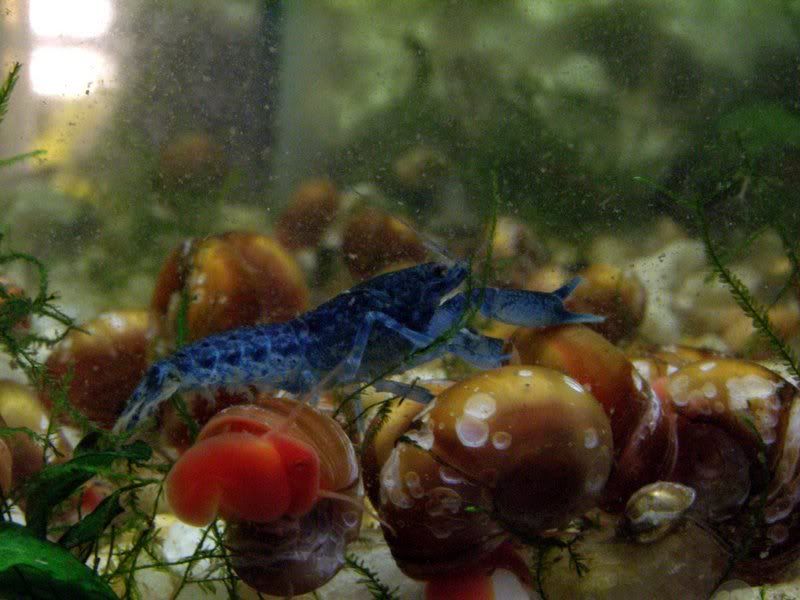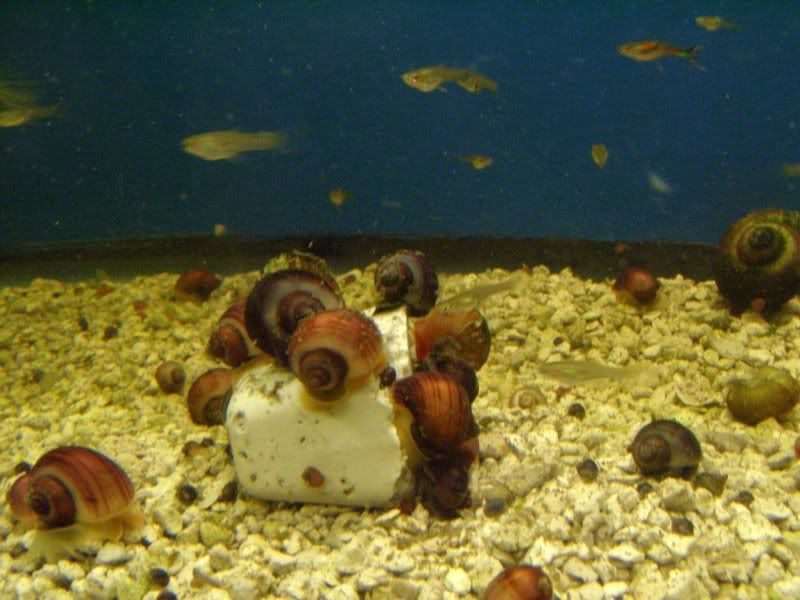Page 1 of 1
MTS Damage on Red Rams
Posted: Thu Nov 01, 2007 4:26 pm
by badflash
Ihave now confirmed that MTS will drill the shells of rams horn snails. Here is a pic I've posted before, but for the cray, not the snails:

I've seen nerites do something similar in their quest for calcium. It doesn't seem to hurt the snails, it just makes them ugly.
Posted: Thu Nov 01, 2007 4:49 pm
by Neonshrimp

Thanks for the warning, that is pretty bad!
Posted: Thu Nov 01, 2007 5:16 pm
by Guybrush
Strange, I've never seen that happen my tank that have MTS heavily outnumbering the ramshorns. Maybe it's because I have a lot of crushed coral in there.
The outnumbering isn't quite as drastic as the image shows, but you get the idea:

Posted: Thu Nov 01, 2007 5:21 pm
by Baby_Girl
that's really interesting, badflash. Thanks for posting it.
I also keep MTS and ramshorn snails (red, that I bred from commons) in almost all my tanks, and have also not seen this sort of damage before. How big are the reds in your pic, badflash?
My water is fairly hard (GH = 14 deg, TDS ~420 ppm) so maybe the abundance of calcium makes my ramshorns' shells harder? What's your hardness and TDS, badflash?
Posted: Thu Nov 01, 2007 6:00 pm
by badflash
The cray is about 1.25" for scale. My water is as hard as it can get without comming out of solution. Most kits are off scale high for TDS and calcium hardness. I have to de-scale heaters about once a month. That tanks does not have crushed coral, so that could be some of it. Tanks with no MTS show no damage.
hardness prevent erosion, but it takes too much energy to extract calcium from the water. Coral or other snails are a better source. I'll check some of my tanks where I use calcium feeders and see what they look like.
Posted: Thu Nov 01, 2007 8:35 pm
by Baby_Girl
wow, those are fairly big ramshorns then. In my experience, once rams get that large/old, their shells get VERY hard.
I've never found the need to supplement my snails with calcium or cuttlebone, as their shells have always grown in nice and firm with minimal etching. And your water is certainly harder than mine. Just wondering how you made the decision to calcium feed some tanks and not others?
Perhaps I've never noticed this drilling because all my ramshorns are fairly small (0.5 inch max).
Posted: Fri Nov 02, 2007 4:23 am
by badflash
I have some tanks I grow apple snails in. They have a need for lots of calcium as they are so large. I make plaster of paris feeders for them and they chow down. It really helps their shells. I don't need to do this with crays, which is where these guys are.
Posted: Fri Nov 02, 2007 7:58 am
by Neonshrimp
Even though you don't need to do this with the crays, do you see a difference in their health/survival?
Posted: Fri Nov 02, 2007 8:22 am
by badflash
I've never studied it enough to make a judgement. The crays I've lost lately have been due to the darned water.
Posted: Fri Nov 02, 2007 3:33 pm
by Baby_Girl
badflash wrote:I have some tanks I grow apple snails in. They have a need for lots of calcium as they are so large.
oh yeah, I can definitely see how a large, long-lived snail like the larger apple snails would need tons of calcium in their diet.
Posted: Fri Nov 02, 2007 5:07 pm
by badflash
Here are some chowing down on some of my feeder blocks:

These are pretty easy to make and it saves you lots of $$$. They last several weeks.
Posted: Fri Nov 02, 2007 6:44 pm
by Neonshrimp
These are pretty easy to make and it saves you lots of $$$. They last several weeks.
Could you please share your recipe if it isn't a secret. By the way nice picture of your snails and endlers

Posted: Fri Nov 02, 2007 6:50 pm
by badflash
1600 ml of Plaster of Paris (Dap brand from Home Depot)
800 ml of water
1 100 gram container of Tetra Color Sinking Goldfish Granules.
Tools needed are:
A large plastic pitcher 2 liters or larger
A 1 liter measuring cup
3 Ice Cube trays
Something to stir with.
Mix the water and plaster until smooth. Be sure there are no lumps.
Add the fish food and mix it up so that the food is evenly spread.
Pour into the ice cube trays. Rattle the trays on a hard surface to get as many bubbles as possible out of the mix. Let them sit in a dry place for two days.
The next part depends on the humidity. The dryer the air is the better. If the air is damp it may take too long to dry and the bricks may begin to stink. Once they are good & solid you can twist the ice trays and get them out. If you see they are breaking as they come out they are not dry enough yet.
Once they are out of the trays, let them cure for 5 days, again in a dry place. A food dryer can be used in damp weather. If they are not properly cured they will fall apart when added to a tank. Once cured you can then vacuum pack them for storage.



